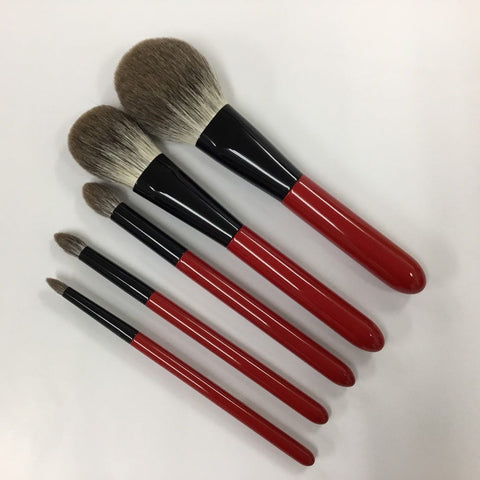
(the picture is grey squirrel brush with Echizen lacquerware – 20,000 yen)
Hi Everyone,
I was informed that
KZ-04
KZ-07
were currently out of stock, and that they would be back late in January.
The Silver fox of Kihtisu price is still not known, but Kihitsu told me that
it should be lower than the Makie silver fox 100,000 yen.

I will write about baseball players in Japan from overseas. Please skip it if you are not interested)
I was reading an article about a baseball player from Canada who played in Japan for eight years.
He retired and lives in Florida now.
His name is Scott Mathieson.
He was asked. What does he miss after he left Japan ?
He said, ‘Food.’
He misses sushi, which he used to eat twice a week in Japan.
Wagyu beef in Tokyo
Chicken in Miyazaki..
Interestingly he misses Pizza in Japan, lol.
There are many players from USA, Canada, these days from Dominica….
Some play well some some do not.
It seems that the key to success is how well they can cope with the Japanese culture.
If they enjoy life, culture, food, they will likely to succeed.
Some players love Tokyo, some like Kobe, Nagoya, Hiroshima… though those cities are so different from each other.
It interests me how they live here with the cultural differences more than how they play baseball.
When I was a junior high school student, there was a book about foreign baseball players.
I read it many times.
It was written by Keio University professor who focused on the cultural aspects of baseball.
That was more interesting than baseball itself.
One player I have never seen but I remember very well from reading is
Viktor Staruchin
He is not from USA nor Canada, nor Dominica.
He is from Russia.
He was born in Russia in 1916, but one of his relatives was a House of Romanov, so his family left Russia in 1917 after the Russian Revolution.
After a long travel from Russia, through Siberia, the Staruchin family landed in Hokkaido in 1925.
The city is called Asahikawa.
He was a very smart kid and played many sports very well. He spoke Japanese perfect.
At that time, many boys were playing baseball.
As a matter of fact, American all-star players came to Japan to play baseball in 1934.
There was no pro team in Japan. College baseball was poplar such as Waseda – Keio rivalry.
So the first professional baseball team was organized to play baseball with the American team.
That was the Tokyo Giants, the first professional baseball team in Japan.
Staruchin was well known to the baseball world, and he was scouted by the All Japan team directly from school.
The American team had Babe Ruth, and Lou Gehrig.
Yes, Ruth and Gehrig played in Japan before World War II.
I am not sure if Staruchin pitched against Ruth or Gehrig, but I feel the history there.
A kid from Russia played baseball with Babe Ruth in Japan right before the World War II.
Staruchin joined Tokyo Giants later.
The Giants are a team of ‘gentlemen’ now (at least they say) but at the time, not everyone was nice to him.
Fujimoto-san, manager of the Giants, said to Staruchin, ‘don’t care about what others say if you want to be Sawamura, the ace of the Giants.’
(Sawamura, the ace pitcher, was drafted and died at the age of 27 in the battle of Philippines.
Baseball was called off between 1943 and 1945. )
Under Fujimoto san, Staruchin became ace of the Giants, and won more than 300 games after the war.
Fujimoto san moved to other teams, and Staruchin followed him.
( By the way, some Russians moved to Japan after the Russian Revolution. Morozoff, very popular chocolate company, and Game company called ‘Taito’ were both founded by Russians who came to Japan after the Russian revolution)
Well, back to Staruchin,
He was killed in a traffic accident when he was 40 years old.
He was loved by people in Hokkaido, and a stadium in Asahikawa was named after him – Staruchin Stadium.
After the games in Japan in 1934, Japanese players was invited to USA to play baseball.
Staruchin was a member of the Japan team.
Since he was raised in the rural city in Hokkaido, he was surprised to see many ‘foreigners’ in America.
( I can imagine that there were very few foreigners in Japan at that time, especially in Hokkaido)
He said to the manager of Japan, ‘those foreigners don’t speak Japanese.’
Thank you for reading,
Toshiya

